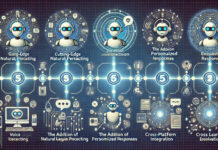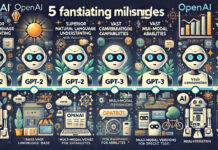Table of Contents
Artificial Intelligence (AI) is revolutionizing the business landscape by offering innovative ways for companies to enhance their competitiveness, efficiency, and product offerings. This transformation extends beyond basic automation to include sophisticated technologies like advanced analytics, machine learning, and natural language processing. These AI applications optimize business processes, facilitate informed decision-making, and enable personalized customer experiences. The influence of AI in business is evident across various industries, demonstrating its versatility and critical role in driving innovation. This article explores how AI is reshaping business operations and strategies, and its connections with AI applications in other sectors such as healthcare, finance, and retail.
1. Streamlining Operations with AI
AI tools enhancing business productivity in a modern office
Businesses leverage AI in business to streamline their operations and cut costs. AI automates routine tasks like data entry, transaction processing, and more complex processes such as supply chain management. With AI algorithms, companies can predict inventory levels, optimize delivery routes, and manage logistics more efficiently. This not only saves time and money but also increases accuracy and minimizes human error.

2. Enhancing Customer Experiences
AI transforms customer service and engagement: Incorporating AI in business greatly enhances customer service and engagement. Chatbots and virtual assistants, powered by natural language processing (NLP), provide round-the-clock support, handling a wide range of customer inquiries without human intervention. These AI systems engage with customers in a human-like manner, making interactions smoother and more satisfying. Additionally, AI-driven analytics enable companies to understand customer behaviors and preferences, allowing for personalized marketing and tailored product recommendations. This targeted approach not only boosts customer satisfaction but also drives sales.
3. Driving Innovation
AI-driven innovations revolutionizing business operations: AI is a catalyst for innovation in product development and business models. For instance, in the automotive sector, companies like Tesla use AI for developing autonomous driving technologies and enhancing vehicles through over-the-air software updates. In finance, AI facilitates high-frequency trading, optimizes risk management, and efficiently detects fraudulent activities. These AI-driven innovations not only provide a competitive advantage but also create significant value for customers, pushing the boundaries of what’s possible in business.

4. Making Data-Driven Decisions
AI’s role in extracting valuable insights: AI in business is pivotal for extracting actionable insights from vast datasets. AI systems analyze market trends, consumer data, and operational metrics, helping businesses make informed strategic decisions swiftly. This capability allows companies to adapt to market changes with agility and precision, enhancing their responsiveness and strategic planning.
5. Ethical and Regulatory Considerations
Navigating ethical and regulatory challenges: As the adoption of AI in business grows, companies face ethical and regulatory challenges. Issues such as data privacy, algorithmic bias, and potential job displacement are significant concerns. Companies must address these challenges thoughtfully to build trust and comply with evolving regulations around data use and AI technologies. A deeper exploration of these ethical considerations can be found here.
Conclusion
The integration of AI in business is revolutionizing company operations and competition. From automating mundane tasks to enhancing customer interactions and driving groundbreaking innovations, AI serves as a key differentiator in today’s business world. The journey with AI in business is only beginning, with vast potential for growth and enhancement across virtually every industry sector. As companies continue to explore and implement these technologies, the business landscape will continue to evolve, driven by intelligent and strategic applications of AI.
For more insights on AI’s transformative capabilities and its broader impact, continue exploring our series on AI Applications.
FAQ
1. How does AI improve business efficiency?
AI improves efficiency by automating routine tasks, optimizing supply chains, and providing data-driven insights for decision-making.
2. What are the benefits of using AI in customer service?
AI enhances customer service through chatbots and virtual assistants, providing 24/7 support and personalized experiences.
3. How does AI contribute to innovation in business?
AI drives innovation by enabling new product developments, optimizing business models, and offering advanced data analytics.
4. What are the ethical concerns related to AI in business?
Ethical concerns include data privacy, AI bias, and the potential for job displacement. Companies must address these responsibly.
5. Can AI completely replace human workers in businesses?
While AI can automate many tasks, it complements rather than replaces human workers, enhancing productivity and allowing for more strategic focus.



